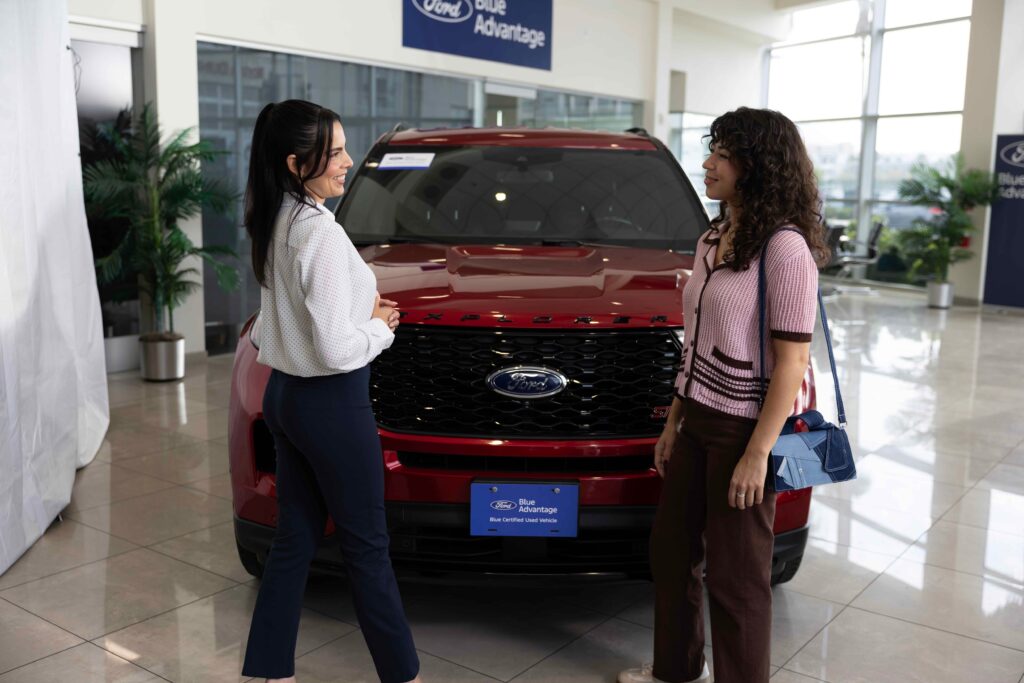Table of Contents
Ford listing its certified pre-owned cars on Amazon.com isn’t a flashy “tech partnership.”
It’s something quieter and much more meaningful — a shift in who controls the first moment of a car search.
Nearly 76% of U.S. car buyers now begin their journey online, and Amazon wants to be the place where that journey starts.

A Car-Buying Experience That Finally Feels Like the Era We Live In
If you’re in Los Angeles, Seattle, or Dallas, you can already feel the difference.
You don’t start at the dealership anymore.
You start on a screen — the same screen where you buy everything else.
And from there, the process feels surprisingly familiar:
- Look through certified Ford cars available at nearby dealerships
- Search from dealers within a 75-mile radius
- Narrow your choices by model, year, mileage, or features
- Handle most of the paperwork online
- Get financing, including Ford Credit
- Pick up your car at a local Ford dealer, only when you’re ready
Legally, the dealership still closes the deal.
But psychologically, it’s no longer the center of the journey.
It’s the final stop.
Ford has a line that sums it up beautifully:
“This program combines the trust and quality of a Ford-certified vehicle with the familiar, convenient shopping experience of Amazon.”
Translation: people trust Amazon’s flow more than a showroom floor.
Why This Partnership Actually Matters
Amazon has been circling the automotive world for a while now.
Hyundai listed new cars on Amazon back in 2023.
Hertz followed with used rentals.
Ford arriving with certified pre-owned inventory brings something bigger to the table.
Certified programs are exploding in popularity because buyers want used prices with new-car confidence.
So yes, Ford joining the platform matters.
But the real story is this:
Amazon isn’t trying to be a car dealer.
It’s trying to be the place where car buying begins.
Consumers already moved the first half of the process online:
- They compare before they visit.
- They expect clarity up front.
- They trust ecosystems more than individual sellers.
- They want fewer surprises and more control.
Amazon is simply stepping into that mental space — the space where decisions first form.
Car Buying Has Finally Entered the Platform Era
We’ve seen this pattern in nearly every major retail category.
Books. Electronics. Furniture. Travel.
Our habits changed first.
The industries followed later.
Car buying is just the latest to make the jump.
And we’re seeing new behaviors take shape:
- Digital-first browsing instead of lot-first wandering
- Certified programs becoming the new trust badge
- Transparent pricing beating negotiation games
- Online financing lowering the emotional cost of buying
- Platforms shaping choices long before a salesperson does
Ford selling on Amazon isn’t a test.
It’s an acknowledgment: this is how people shop now.
And once car buying starts to feel like every other major online purchase…
the old system doesn’t fully come back.
Amazon’s Auto Strategy Is Becoming Impossible to Ignore
Individually, Amazon’s deals look scattered.
Together, they form a map.
- Hyundai → new cars
- Hertz → used rental cars
- Ford → certified pre-owned
Three different slices of the market.
One platform collecting them all.
Amazon doesn’t want to be the one handing over the keys.
It wants to be the one framing the choice.
In retail, that’s where the power is — the first moment of intent.
The Quiet Technology Behind This Shift
A lot of what makes these new buying behaviors feel natural lives inside the devices we already use every day.
The AI-driven responsiveness, the predictive search, the smooth interfaces — they come from the work of chipmakers like MediaTek, whose processors run in billions of devices.
It’s the tech we never notice that makes this kind of shift possible.
Not the platforms alone, but the invisible machinery underneath them.
What’s the Catch?
For all its benefits, the model is still evolving:
- Only three U.S. cities support it right now
- Dealer participation determines inventory
- Amazon isn’t offering home delivery
- The final handoff still happens under dealership laws
In other words:
Amazon now controls the discovery and decision phases —
but the last step still belongs to the old world.
That tension isn’t a flaw.
It’s a hint about where disruption could land next.
Key Takeaways
- More car buyers now start on Amazon instead of dealer websites.
- Ford is aligning itself with modern, platform-native shoppers.
- Certified pre-owned cars — including EVs — are moving into the e-commerce ecosystem.
- Dealerships remain part of the process, but no longer define it.
- The future of car retail is platform-based, and Amazon is quietly steering it.
Explore Tech trends
📊 Industry Research Sources
- Cox Automotive (Car-Buying Trends Report)
- Deloitte Global Auto Consumer Study
- McKinsey Auto Retail Insights

